
Why Are Popular Brands Suddenly Winning Big in Google Results?
If you thought things would calm down in SERPs for a while after the mammoth rollout of Google’s March 2024 core algorithm update finally ended, think again. There’s more strange activity happening, and it seems to be benefitting well-known brands (lucky them). It was first pointed out a few weeks ago, in a tweet by Lily Ray:
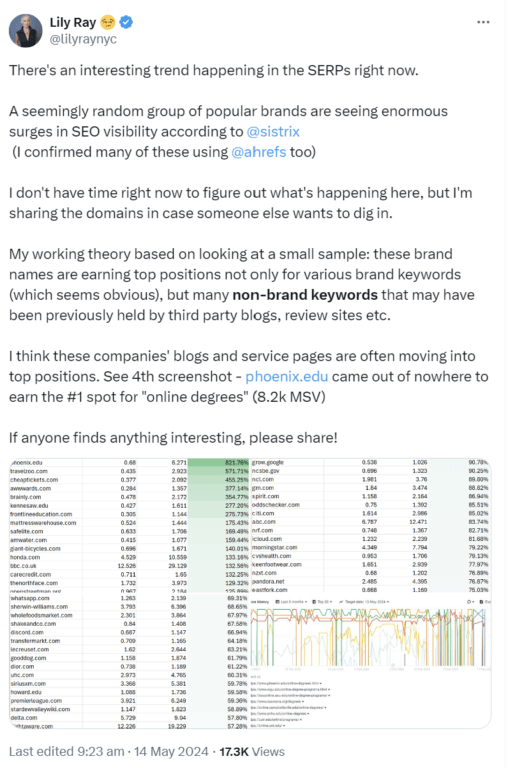
Source: Twitter.com
In a nutshell, a large group of seemingly unconnected but recognisable brands have shot to the top of Google’s search results for non-brand terms that they were ranking much lower for, or not ranking at all, just a few days before. Why is this happening? Is Google suddenly favouring big brands, even more than it already did? Have brand mentions started playing an even bigger role in the algorithm? I’ve been taking a closer look at this to see what I can find.
Looking at the top three sites in Lily’s list (Taskrabbit, University of Phoenix and Travelzoo), it looks like it’s their blog and service pages that are seeing the biggest visibility increases. Their home pages, and sometimes other pages, have also seen ranking improvements in some cases, but to a much lesser degree. So it does appear that there could be something special about these blog and service pages that Google likes (for now, at least).
Between all of the sites listed, these pages will look different to Googlebot in many ways – how they are laid out, the language used, how they are coded, the list goes on. Even just focusing on blog posts of the three top sites, while they certainly have similarities (they’re all blog posts, after all), there are many differences in both the design and the code:
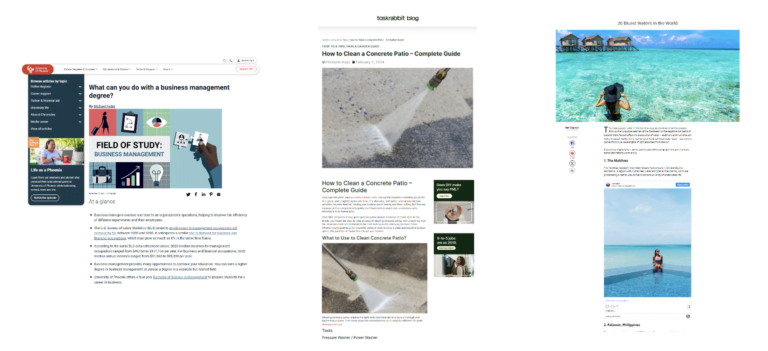
Plus, any similarities these types of pages have, whether it’s in terms of content, layout, or technical structure, are likely to be shared with the pages they’ve ousted from the top spot. For example, the “How to Clean a Concrete Patio” blog post on Taskrabbit, which has leapt up to the top spot in Google results for “what to clean cement with” (among other things), has pushed down other blog posts from sites of (arguably) less recognisable brands:
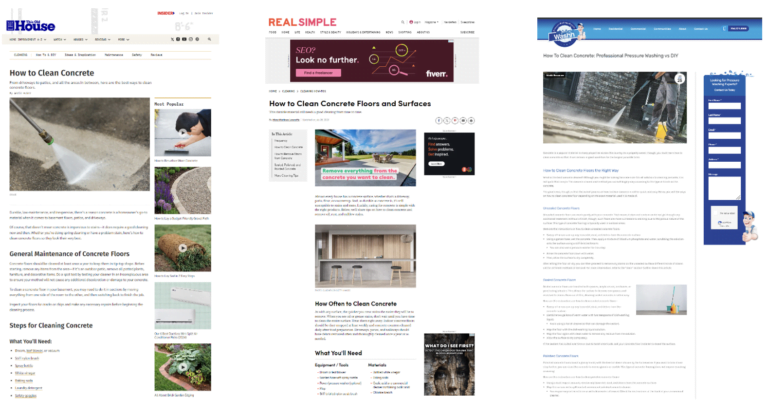
These blog posts are all pretty similar to Taskrabbit’s post that’s just overtaken them. The main difference seems to be that Taskrabbit has the stronger brand name, as evidenced by a quick look at US search volumes for some of these brands in Google Keyword Planner:
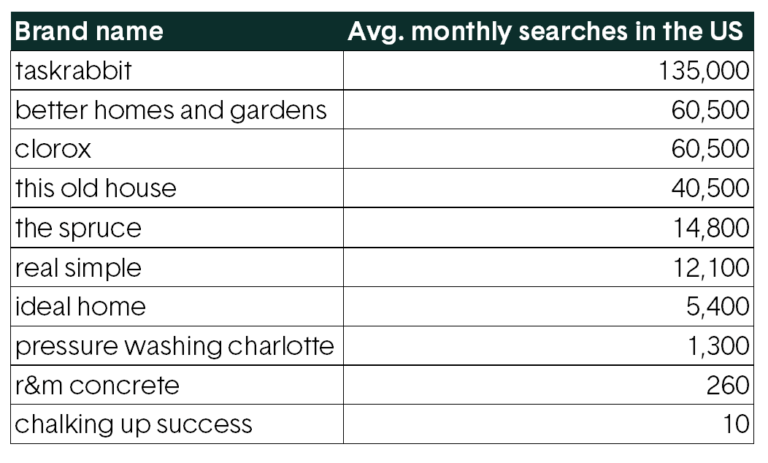
Looking outside of those top three sites throws up some interesting results. For example, gm.com’s home page is now suddenly ranking in the top three for “Pontiac” in the US, despite not mentioning Pontiac anywhere on that page. Of course, General Motors did own and manufacture the Pontiac brand, but the line was discontinued in 2010*. It’s not that surprising, then, that GM don’t mention it on their home page. But in that case, why does Google think it warrants a top spot in the search results for that term?
Is it the links?
The GM website does have a lot of backlinks (almost 4,000 at the time of writing this) that use the word “Pontiac” in their anchor text – could this be the reason?It’s certainly possible, but only 18 of those links point to the home page – so why wouldn’t a deeper page rank? The domain Pontiac.com also redirects to the GM homepage, so there’s a good chance that’s started to help them – but why has it only just now started to rank?
When I look at the cement cleaning page on Taskrabbit mentioned above, that only has 7 direct backlinks with relevant anchor text, according to Ahrefs. The Taskrabbit site as a whole has 60 backlinks, including those 7, which use the word “cement” in their anchor text, so not a huge amount. Other pages that have made this big leap seemingly have no direct links from other sites at all; for example, Taskrabbit has started ranking in the top three results for “housecleaning”, which gets around 8,000 searches each month in the US. But the page that’s ranking, www.taskrabbit.com/services/cleaning/house-cleaning, has no backlinks at all. So, it doesn’t look as though it’s backlinks or anchor text that are tipping the balance here.
Another interesting result is for “motorcycles” in the US, where the powersports.honda.com home page has started ranking in the number 2 spot. It’s certainly relevant, although arguably its parent domain is more so. The powersports homepage does contain the word “motorcycle” a few times, although arguably again, a more deserving page to rank for this keyword would be Honda’s dedicated Motorcycle page. There are currently over 7,200 links directly to that page that use the word motorcycle or motorcycles in their anchor text but, as we’ve already seen, that’s not the case in other instances of these sudden rises.
So again, it’s not that strange that this page is ranking high in Google for this particular term. But why this page over others? What’s changed to make it suddenly outrank those pages? And why wasn’t it ranking well for this term before?
Looking closer to home raises similar questions. Search visibility for the BBC website, which was already very high, almost trebled overnight in the UK at the same time as these other brands saw huge rises:
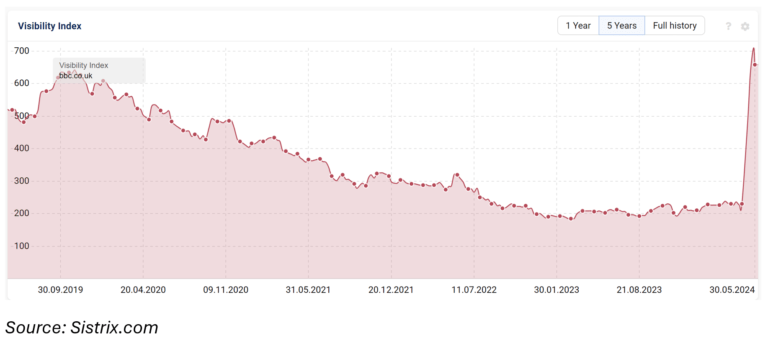
Looking into some of the top keyword rises for the BBC, most of them seem like no-brainers, mainly relating to news and sport:
- football womens world cup 2023
- epl
- celtic news
- joe biden
- huddersfield town
- iran
- juventus
- golf
- midfielder
- rhs
All perfectly sensible, but why the sudden shift, and why weren’t they ranking at all for these terms previously? I wouldn’t have been surprised to see the BBC ranking on the first page of Google for any of these queries at any point in the past, but it seems it wasn’t until just a few weeks ago.
Of course, the ever-changing news cycle may have a part to play here. Sites like the BBC are constantly creating new pieces of content relating to terms like those above, so it’s natural that there would a lot more movement in SERPs for these types of queries. For example, a quick look in Google Trends shows me that, unsurprisingly, there were far more searches for “football womens world cup 2023” in August last year than now. As the creation of new content on this subject has dwindled, it’s probably natural for an already high-performing site like the BBC to rise to the top. But that kind of churn would be constant; this doesn’t explain the seismic shifts of the last few weeks, or why other brands are suddenly performing much better for terms that aren’t related to current events.
Staying this side of the pond, I looked at similar sites to Taskrabbit in the UK, to see how they’ve performed recently. Checkatrade has had some ups and downs in rankings but nothing out of the ordinary and it looks like a fairly average month for them. It’s similar for Bark.com, who’ve had a few ranking increases but none from seemingly out of nowhere and none where they’re suddenly occupying the top spot. So it looks like not all brands are benefitting from this change.
Is it citations?
I’ve been wondering if what we’re seeing here is an example of the strength of brand mentions, without links, as a ranking signal. People have been talking about this in SEO for a long time; that Google uses mentions of a brand around the web as an indicator of trust and authority, which then translates into stronger visibility in search. Google even took out a patent on something that sounds very much like this back in 2012, but have also stated previously that “implied linking” is not a ranking signal. But the idea persists, and has often been used to herald the death of actual backlinks as a ranking factor– something my colleague Dave Peiris discussed recently on LinkedIn.
It’s fair to assume that the more well-known a brand is, the more often it will be talked about, whether that’s in blog posts, forums, social media or any other online source. If citations now play a bigger part in how sites perform in search, bigger brands will suddenly have the upper hand.
This would be inherently unfair. Bigger brands already have the advantage, both online and offline. Their recognisability engenders trust (mostly), which leads to them getting more clicks, which is another ranking signal that already puts them ahead of the game. If what we’re seeing at the moment is a sign of Google relying more heavily on citations, it could lead to an extremely uneven playing field.
Is it user behaviour?
One interesting site that’s started to perform extremely well is nhs.net in the UK.
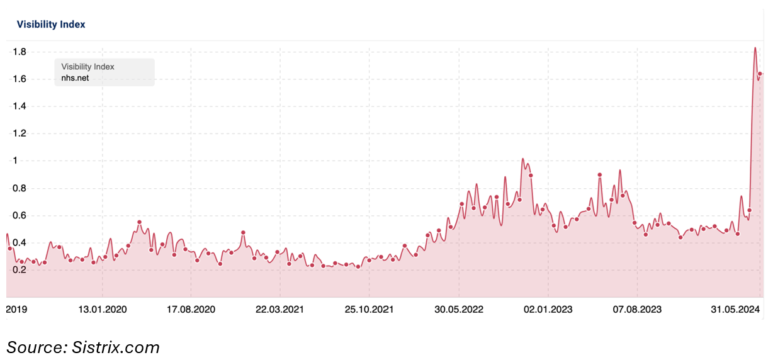
Surprisingly though, this isn’t the public-facing domain – that’s nhs.uk – this is an internal intranet used by NHS staff. And it’s started ranking well for keywords like “email”, “helpdesk” and “join teams”.
For the keyword “join teams”, here’s the difference between the results on page 1 from the start of May to later in the month. Microsoft has (probably correctly) 8 results in the top 10, but for some reason nhs.net is able to rank in #7.
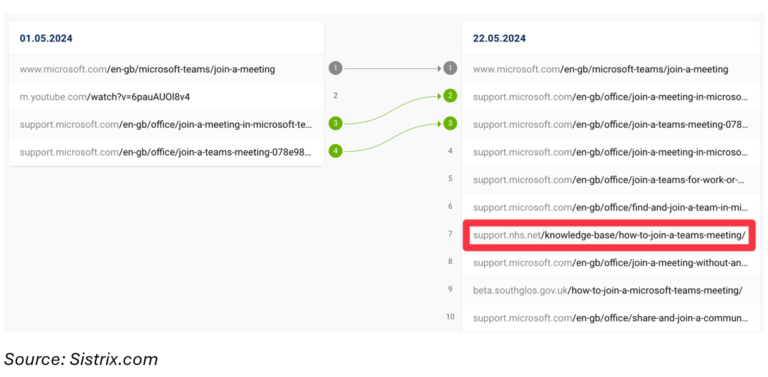
Despite nhs.net being an intranet, it’ll be heavily used – the NHS employs around 1.7 million people in the UK. Lots of those people might well be searching for keywords about accessing their NHS email, or joining a Teams meeting and then clicking on the NHS portal result. It’s likely that data then at least partly influences the rankings for the nhs.net domain for everyone in search. Maybe this is a factor that Google dialled up in early May?
I’ve not found any solid conclusion or easy answers here. What I can say for certain is that there’s been a big shift in Google SERPs, in favour of some (but crucially, not all!) popular brands, and there’s no sign of this being rolled back. It’s possible that links, brand mentions or user behaviour all have a part to play, or that maybe RankBrain or some other AI element to the algorithm has suddenly gotten better at associating certain brands with particular words or phrases. I still have more questions than answers, though, and am really interested to see what others come up with in way of explanation. Let me know if you have any theories or, even better, hard evidence!
*While doing this research, I stumbled upon a handful of recent videos and articles, including this one, that suggest that Pontiac may be making a comeback. These are based on a recent ad placed in US car magazines, so there may be some truth to it. However, I have no reason to believe this has any connection to what’s happening with gm.com’s rankings, and there’s no equivalency with any of the other brands or sites I’ve looked at. Uncanny timing, though!



